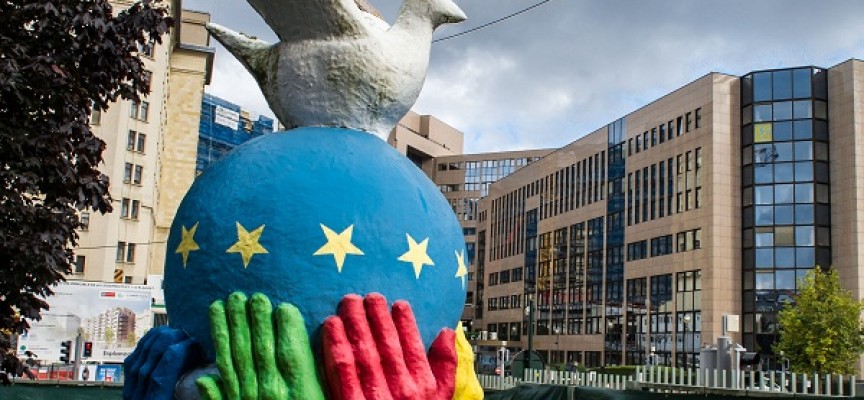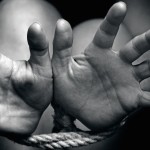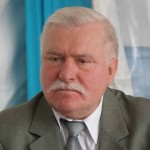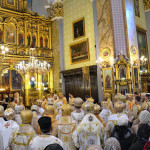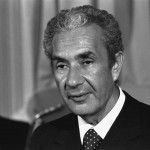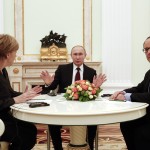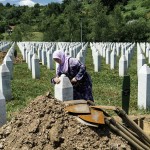May 8th, 2015, the 70th anniversary of the end of the Second World War
May 9th, 2015, the 65th anniversary of the Declaration of Robert Schuman
In these difficult times on the European continent, it is useful to remember that from May 9th, 1950 there has not been an armed conflict between the member states of the European Union. In doing so, the tragedies that occurred when former Yugoslavia broke out, yesterday, or even the one which the populations of Ukraine are suffering today are not to be forgotten.
Five years, only five years after the armistice of May 8th, 1945, the declaration of Robert Schuman, which founded what is the European Union in 2015, has rooted in a fundamental triptych: reconciliation, solidarity and peace. “Europe was not achieved and we had war” recalls Schuman’s declaration. And war is now at the European borders. The Baltic states, but also Poland, Romania and Bulgaria, all members of the European family, are directly affected.
Assassinating Boris Nemtsov in Moscow meant assassinating the opposition to the war in Ukraine, and has meant, in a wider context, challenging the peace in Europe.
The Franco-German reconciliation remains the fundamental basis of the construction of Europe over the past 65 years. It was the element in the spotlight in order to build a compromise that remains fragile but that exists to try to stop the invasion of Ukraine by Russia. It is the Franco-German couple who favoured the meeting between the President of Ukraine and the Russian one, it is the peace couple that follows, day after day, the implementation of the compromise.
The European Union also exists to protect its populations. In this tense situation let us remember Article 222 of the European Treaty: “‘The Union and its Member States shall act jointly in a spirit of solidarity if a EU Member State is the object of a terrorist attack or the victim of a natural or man-made disaster”. Although the European Union has not a real defense policy, since the French Parliament refused in 1954 to ratify the treaty establishing the European Defence Community (EDC), in case of need “the Union shall mobilize all the instruments at its disposal, including the military resources made available to it by the Member States …”.
To switch from instability to security, or better yet, from war to peace that is never guaranteed for lifetime, let us remember this message of Robert Schuman, always topical: “The harsh lessons of history have taught the man of the border, as I am, to distrust naive improvisations, over-ambitious projects, but they also taught me that when an objective judgment, thought through, based on the will of facts and of the best interests of human beings, leads us to new initiatives, sometimes revolutionary, it is necessary – even if they collide with established habits, centuries-old antagonisms and old practices – to remain faithful and to persevere. Let us safeguard this leading thread in our memory for the fulfillment of our actions”.
Read more: www.centre-robert-schuman.org
8 maggio 2015, 70° anniversario della fine della seconda Guerra Mondiale
9 maggio 2015, 65° anniversario della dichiarazione di Robert Schuman
In questi tempi difficili sul continente europeo, è utile ricordare che dal 9 maggio 1950 non c’è più stato un conflitto armato tra gli stati membri dell’Unione europea. Così facendo, non si tratta di dimenticare i drammi che si sono verificati quando è scoppiata l’ex-Jugoslavia, ieri, o ancora quello che subiscono le popolazioni dell’Ucraina oggi.
Cinque anni, solo cinque anni dopo l’armistizio dell’8 maggio 1945, la dichiarazione di Robert Schuman, che ha fondato ciò che l’Unione europea è nel 2015, si è radicata su un trittico fondamentale: riconciliazione, solidarietà, pace. “L’Europa non è stata fatta: abbiamo avuto la guerra” ricorda la dichiarazione di Schuman. E la guerra è oggi alle frontiere dell’Unione europea. Gli stati baltici, ma anche la Polonia, la Romania e la Bulgaria, tutti membri della famiglia europea, ne sono direttamente toccati.
Assassinare Boris Nemtsov a Mosca ha significato assassinare l’opposizione alla guerra in Ucraina, ha significato in un contesto più ampio rimettere in discussione la pace in Europa.
La riconciliazione franco-tedesca resta la base fondamentale della costruzione europea in questi ultimi 65 anni. È stato l’elemento sotto i riflettori per costruire un compromesso che resta fragile ma che esiste per cercare di fermare l’invasione dell’Ucraina da parte della Russia. È la coppia franco-tedesca che ha favorito l’incontro tra il presidente ucraino e quello russo, è la coppia della pace che segue giorno dopo giorno la messa in atto del compromesso.
L’Unione europea esiste anche per proteggere le sue popolazioni. In questa situazione di tensione ricordiamo l’articolo 222 del Trattato europeo: “L’Unione e gli Stati membri agiscono congiuntamente in uno spirito di solidarietà qualora uno Stato membro sia oggetto di un attacco terroristico o sia vittima di una calamità naturale o provocata dall’uomo”. Sebbene l’Unione europea non abbia una vera politica di difesa, dal momento che il parlamento francese ha rifiutato nel 1954 di ratificare il trattato che istituiva la Comunità europea di difesa (CED), in caso di bisogno “l’Unione mobilita tutti gli strumenti di cui dispone, inclusi i mezzi militari messi a sua disposizione dagli Stati membri…”.
Per passare dall’instabilità alla sicurezza, o meglio ancora dalla guerra alla pace che non è mai garantita a vita, ricordiamo questo messaggio di Robert Schuman, sempre attuale: “Le dure lezioni della storia hanno insegnato all’uomo della frontiera, quale io sono, a non fidarsi delle improvvisazioni ingenue, dei progetti troppo ambiziosi, ma mi hanno anche insegnato che quando un giudizio oggettivo, riflettuto a fondo, basato sulla volontà di fatti e dell’interesse superiore degli esseri umani, ci conduce a iniziative nuove, a volte rivoluzionarie, è necessario – anche se esse urtano con le abitudini consolidate, gli antagonismi secolari e le pratiche antiche – restarvi fedeli e perseverare”. Possiamo noi custodire questo filo conduttore nel nostro ricordo per la realizzazione delle nostre azioni.
Per saperne di più: www.centre-robert-schuman.org
Europe: de la guerre à la paix
8 mai 2015, 70e anniversaire de la fin de la seconde guerre mondiale
9 mai 2015, 65e anniversaire de la déclaration de Robert Schuman
En ces temps troublés sur le continent européen, il est utile de rappeler que depuis le 9 mai 1950, il n’y a plus eu un conflit armé entre Etats membres de l’Union européenne. Ce faisant, il ne s’agit pas d’oublier des drames qui se sont déroulés lors de l’éclatement de l’ex-Yougoslavie hier, ou encore ce que subissent les populations d’Ukraine aujourd’hui.
Cinq ans – seulement cinq ans – après l’Armistice du 8 mai 1945, la déclaration de Robert Schuman, fondatrice de ce qu’est l’Union européenne en 2015 repose sur un triptyque fondamental: Réconciliation, Solidarité, Paix.
“L’Europe n’a pas été faite, nous avons eu la guerre” rappelle la déclaration de Schuman
Et la guerre est aujourd’hui aux frontières de l’Union européenne. Les Etats de la Baltique, mais aussi la Pologne, la Roumanie et la Bulgarie tous membres de la famille européenne sont directement concernés.
Assassiner Boris Nemtsov à Moscou c’est assassiner l’opposition à la guerre en Ukraine, c’est mettre en cause la paix, plus largement, en Europe.
La réconciliation Franco/Allemande reste la base fondamentale de la construction européenne de ces 65 dernières années. Elle a été à la une de l’actualité pour bâtir un compromis, qui reste fragile, mais qui existe pour tenter de stopper l’invasion de l’Ukraine par la Russie. C’est le couple franco/allemand qui a favorisé la rencontre entre le Président ukrainien et le Président russe, c’est le couple de la paix qui suit au quotidien la mise en œuvre du compromis.
L’Union européenne est là aussi pour protéger ses populations. Dans cette situation de tension, rappelons l’article 222 du Traité européen “L’Union et ses Etats membres agissent conjointement dans un esprit de solidarité si un Etat membre est l’objet d’une attaque terroriste ou la victime d’une catastrophe naturelle ou d’origine humaine”. Bien que l’Union européenne n’ait pas de véritable politique de Défense depuis que le Parlement français a refusé la ratification, en 1954, du traité instituant une “Communauté européenne de défense – CED”, en cas de besoin, “L’Union européenne mobilise tous les instruments, y compris les moyens militaires mis à sa disposition par les Etats membres…”.
Pour passer de l’instabilité à la sécurité ou mieux encore de la guerre à la Paix qui n’est jamais garantie à vie, gardons en mémoire ce message de Robert Schuman, toujours d’actualité : “Les dures leçons de l’Histoire ont appris à l’homme de la frontière que je suis à se méfier des improvisations hâtives, des projets trop ambitieux, mais elles m’ont appris également que lorsqu’un jugement objectif, mûrement réfléchi, basé sur la volonté des faits et l’intérêt supérieur des hommes, nous conduisent à des initiatives nouvelles, voire révolutionnaires, il importe – même si elles heurtent les coutumes établies, les antagonismes séculaires et les routines anciennes – de nous y tenir fermement et de persévérer”.
Puissions nous garder ce fil conducteur dans nos mémoires pour la mise en œuvre de nos actions.
Pour en savoir plus: www.centre-robert-schuman.org
Jean-Pierre Bobichon
Latest posts by Jean-Pierre Bobichon (see all)
- Europe: from war to peace - 15 aprile 2015

